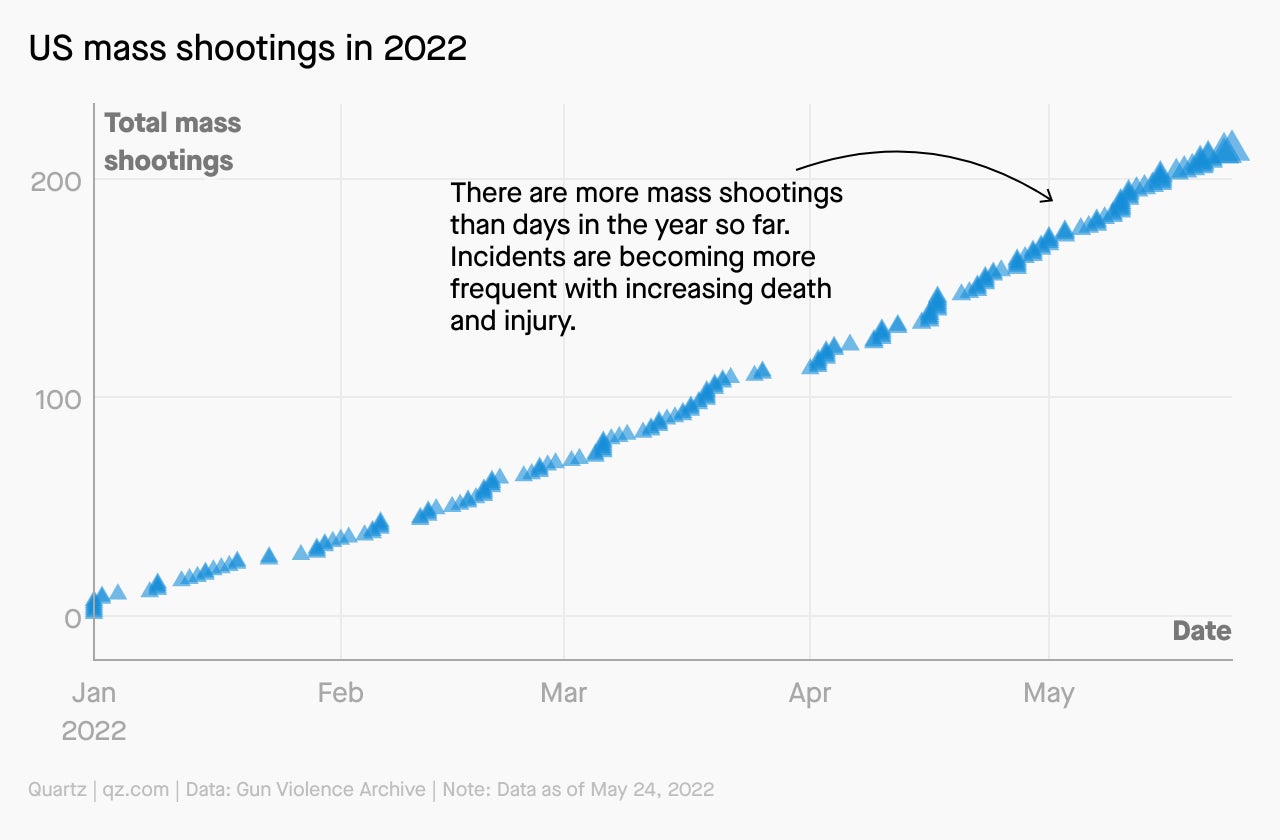🌍 Will the US act on gun control?
Good morning, Quartz readers!


Good morning, Quartz readers!
Here’s what you need to know
Ukraine set its terms for diplomatic talks with Russia. Volodymyr Zelenskyy stated that Russia must pull back its troops to their pre-war positions. Meanwhile, Russia stated it would release Ukraine grain exports if sanctions are lifted.
China announced a 33-point stimulus package. The policies are designed to “get the economy back on a normal track,” though analysts have questioned its efficacy as a zero-covid strategy still remains in place.
World leaders responded to the Uvalde, Texas school shooting. Pope Francis called for gun control, while Zelenskyy tweeted that the people of Ukraine “share the pain” of Americans.
India, the world’s largest sugar producer, is restricting exports. The announcement followed India’s earlier ban on wheat exports, and Brazil’s canceled sugar export contracts last week, marking a global rise in food protectionism. Thailand, a major food exporter, stands to benefit.
The US central bank may raise rates more aggressively than anticipated. Federal Reserve minutes released yesterday indicated faster, higher rate hikes to combat inflation.
The largest-ever crypto fund was announced. US venture capital firm Andreessen Horowitz raised $4.5 billion to back crypto and blockchain companies. The news has arrived amidst weeks of crypto market upheaval.
What to watch for

When Anthony Albanese was elected prime minister of Australia on May 22, climate change may have given him the deciding edge. Albanese campaigned on a promise to “end the climate wars” that have divided Australian politics in recent years and left the country lagging on climate policy among its peers. His policy promises to cut emissions 43% by 2030 from a 2005 baseline, and to turn the country into a “renewable energy superpower.”
But Albanese plans to go easy on the fossil fuel industry. The country is one of the world’s top exporters of liquified natural gas and supplies about 7% of global coal, a share that is steadily rising as the country invests in dozens of new coal projects alongside its solar panels and green hydrogen plants. Albanese’s new constituents may have some questions around how those projects are compatible with his broader emissions agenda.
A reckoning on gun culture

As the US reels from the murders of 19 children and two teachers by a single 18-year-old man with a very powerful gun, the big question seems to be, “Is anyone willing to do anything about it?”
Here’s where we are:
- After mass shootings, gun-toting Americans tend to stock up to protect themselves from other armed people and/or stricter gun control laws. Firearm and ammunition stocks are soaring in anticipation.
- A spate of recently passed Texas laws made it a lot easier to own and carry guns.
- Just days before the attack, a federal judge struck down a California ban on selling guns to buyers under 21.
- The National Rifle Association is moving forward with its annual meeting in Houston this week. (It did the same thing after the Columbine High School shooting in 1999.)
Are Terra’s troubles over?
After a rough couple of weeks, Terra founder Do Kwon will attempt to salvage something from the great Terra/Luna crypto experiment with a grand restructuring. But will it work? The latest issue of The Forecast examines what’s next for crypto, now that a stablecoin that didn’t live up to its name triggered losses in the hundreds of billions.
✦ Quartz members get a glimpse of the future with an issue of The Forecast in their inboxes every week. Get 40% off when you subscribe today.
Surprising discoveries
Before ketchup, there was kê-tsiap. The condiment, whose name comes from a Hokkien word, was brought over to Britain from Asia in the 17th century.
These shoes are trash-chic. Balenciaga designed garbage-style sneakers that sell for over $1,800. Apparently to make a statement about…the environment.
Ancient Maya wore anti-bacterial teeth bling. The practice of embedding their pearly whites with gems may have been more than just an aesthetic or spiritual practice.
Neolithic British cuisine was bloody delicious. Scientists have found that dwellers near Stonehenge dined on raw cow innards.
Perfumes are only about 20% natural. The inclusion of synthetic fragrances into perfumes in the late 19th century changed the scent game for good. 🎧 You’ll need your ears, not your nose, for this week’s episode of the Quartz Obsession podcast.
👃 Listen on: Apple Podcasts | Spotify | Google | Stitcher
Our best wishes for a productive day. Send any news, comments, mustard origins, and tooth adornments to [email protected]. Reader support makes Quartz available to all—become a member. Today’s Daily Brief was brought to you by Tim McDonnell, Julia Malleck, and Susan Howson.